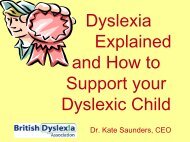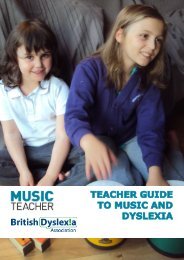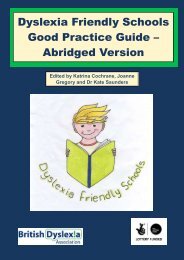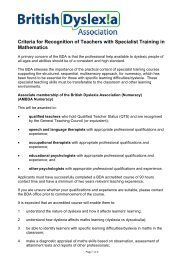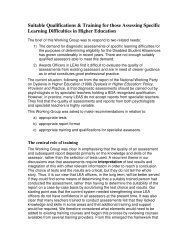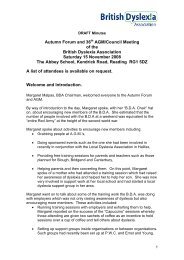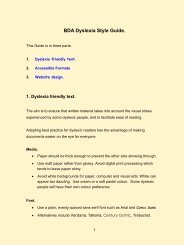Intervention for Dyslexia - The British Dyslexia Association
Intervention for Dyslexia - The British Dyslexia Association
Intervention for Dyslexia - The British Dyslexia Association
Create successful ePaper yourself
Turn your PDF publications into a flip-book with our unique Google optimized e-Paper software.
although the reading age gains look good, in fact, the child with a reading age of 6<br />
years 7 months has minimal reading skills and is still a beginning reader.<br />
5.6 Conclusions<br />
5.6.1 <strong>The</strong> efficacy of Reading Recovery<br />
<strong>The</strong>re is sufficient evidence of good quality to show that Reading Recovery benefits a<br />
considerable proportion of the children with literacy difficulties whom it serves in the<br />
short term. Evidence of maintenance of the gains in the longer term is mixed. Some<br />
studies show washout, others do not. In particular, the London and Surrey study in<br />
1992–96 had very disappointing long-term outcomes, though this may mean that there<br />
was insufficient continuing support <strong>for</strong> the children when they returned to their<br />
classrooms full-time. More recent evidence from ECaR appears to show better<br />
maintenance of gains. Comparisons of ratio gains <strong>for</strong> Reading Recovery and <strong>for</strong><br />
phonologically based schemes appear on balance to favour the latter.<br />
Moreover, the analysis of National Curriculum assessment results of children on Reading<br />
Recovery programmes over the period 2003–2007 (see Section 5.5.2) does not, in fact,<br />
support the view that Reading Recovery in England achieves its stated goal <strong>for</strong> “children<br />
to develop effective reading and writing strategies in order to work within an average<br />
range of classroom per<strong>for</strong>mance”. At the end of Key Stage 1, this was clearly not the<br />
case. In Key Stage 1 Reading National Curriculum assessments less than half of Reading<br />
Recovery children achieved a Level 2b or better, and although Level 2b is classed as the<br />
national ‘target’ level, this is nevertheless below that necessary <strong>for</strong> effective independent<br />
reading. Only 12%–15% of Reading Recovery children completing their programmes<br />
between 2003 and 2007 achieved a Level 2a or above in Key Stage 1 Reading National<br />
Curriculum assessments, the level at which children can tackle unfamiliar words and<br />
have there<strong>for</strong>e developed a self-sustaining word recognition system. <strong>The</strong> results on the<br />
<strong>British</strong> Abilities Scales Word Reading Test do not suggest a different conclusion. It<br />
remains to be seen whether the recent claims by ECaR <strong>for</strong> an increased emphasis on<br />
phonics teaching in Reading Recovery will be reflected in better achievement <strong>for</strong> pupils<br />
on Reading Recovery programmes. In order to evaluate this matter properly, however,<br />
and determine what is the best way <strong>for</strong> children to learn to tackle unfamiliar words and<br />
so develop a self-sustaining word recognition system, an experimental study is required.<br />
Such a study should compare the effectiveness of Reading Recovery as currently<br />
implemented (i.e. with its proclaimed increased emphasis on phonics) and Reading<br />
Recovery which includes daily systematic structured phonics teaching using one – or<br />
comparing all three – of the most popular early phonics programmes.<br />
5.6.2 Reading Recovery as an intervention <strong>for</strong> children with dyslexia<br />
Literature searches failed to uncover any published research studies or evaluations of<br />
Reading Recovery being used with pupils who had been identified as having dyslexia.<br />
This is not altogether surprising, since Reading Recovery is not designed to be used with<br />
dyslexic children, but it is there<strong>for</strong>e impossible to judge from research evidence whether<br />
118 <strong>Intervention</strong> <strong>for</strong> <strong>Dyslexia</strong>



